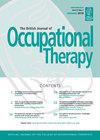反复入院的老年人的近亲对家中日常活动的看法:一项定性研究
IF 1.3
4区 医学
Q3 REHABILITATION
引用次数: 0
摘要
当老年人出院回家时,亲戚很重要。本研究的目的是描述近亲属的观点,日常活动的老年人反复再次入院和出院回家。采用半结构化访谈收集20名亲属(年龄45-82岁)的数据。数据分析使用演绎定性内容分析的基础上,在这一领域的先前研究的结果。总体主题“需要支持来管理不可预测的日常生活”表明,老年人在日常活动中经常需要支持。在“处理不稳定的一天的困难”和“管理不稳定的一天”两个类别以及10个子类别中,近亲描述了老年人需要亲戚或其他人以各种方式提供支持。密切接触对于日常家庭活动以及保持社会联系和与医疗保健机构的联系非常重要。研究发现,在出院时评估社会需求,如社会接触/活动,与医疗和功能需求同样重要。本文章由计算机程序翻译,如有差异,请以英文原文为准。
Close relatives’ perspectives of everyday activities at home for older adults repeatedly readmitted to hospital: A qualitative study
Relatives are important when older adults return home after a hospital stay. The aim of this study was to describe close relatives’ perspectives of the everyday activities of older adults who are repeatedly readmitted to hospital and discharged to home. A semi-structured interview was performed to collect data from twenty relatives (aged 45–82 years). Data were analysed using a deductive qualitative content analysis based on the results of a previous study within this field. The overall theme ‘In need of support to manage an unpredictable everyday life’ shows that the older adults often needed support in everyday activities. In the two categories ‘Difficulties in dealing with an unstable day’ and ‘Managing an unstable day’ and the 10 subcategories, close relatives described that the older adults needed support in various ways from relatives or other individuals. Close contact was important for how everyday activities worked at home and in maintaining social contacts and contact with healthcare. It was found that social needs, such as social contacts/activities, are just as important to assess at discharge as medical and functional needs.
求助全文
通过发布文献求助,成功后即可免费获取论文全文。
去求助
来源期刊

British Journal of Occupational Therapy
REHABILITATION-
CiteScore
2.20
自引率
15.40%
发文量
81
审稿时长
6-12 weeks
期刊介绍:
British Journal of Occupational Therapy (BJOT) is the official journal of the Royal College of Occupational Therapists. Its purpose is to publish articles with international relevance that advance knowledge in research, practice, education, and management in occupational therapy. It is a monthly peer reviewed publication that disseminates evidence on the effectiveness, benefit, and value of occupational therapy so that occupational therapists, service users, and key stakeholders can make informed decisions. BJOT publishes research articles, reviews, practice analyses, opinion pieces, editorials, letters to the editor and book reviews. It also regularly publishes special issues on topics relevant to occupational therapy.
 求助内容:
求助内容: 应助结果提醒方式:
应助结果提醒方式:


